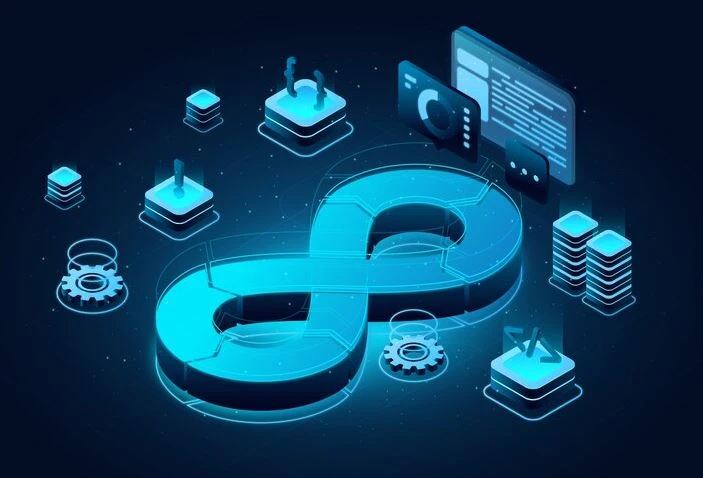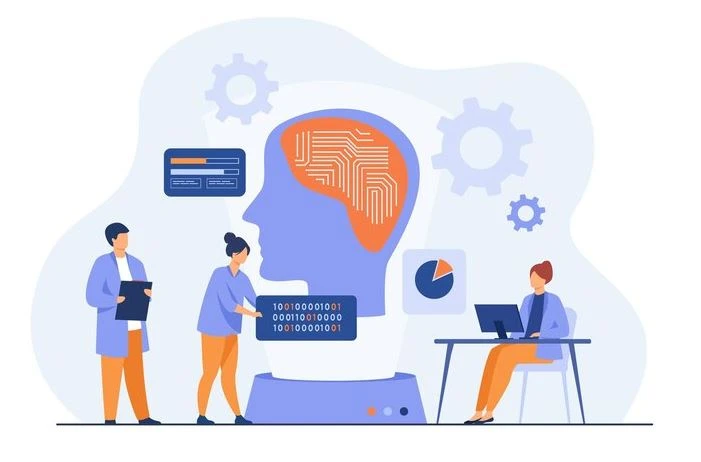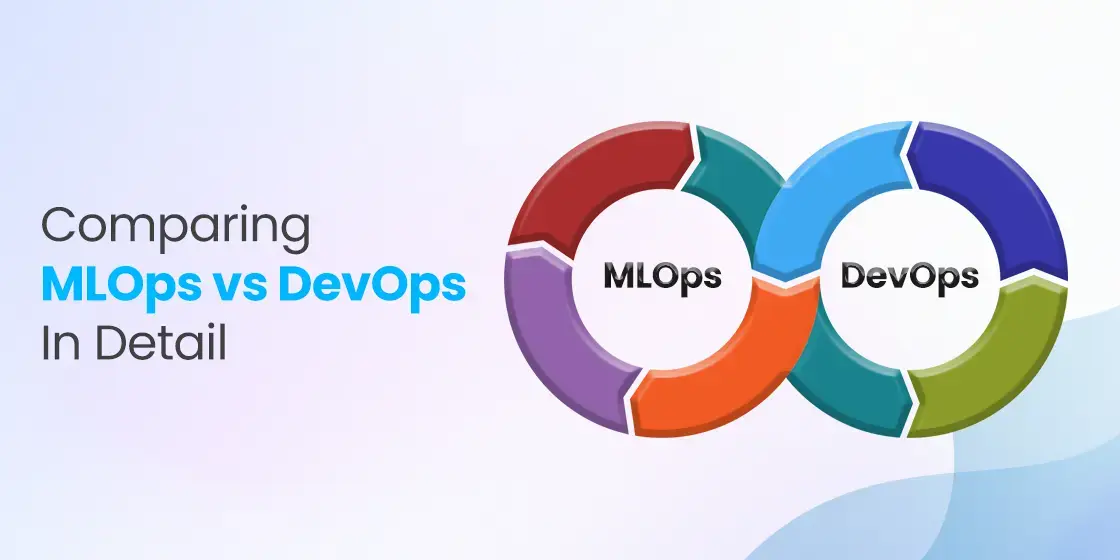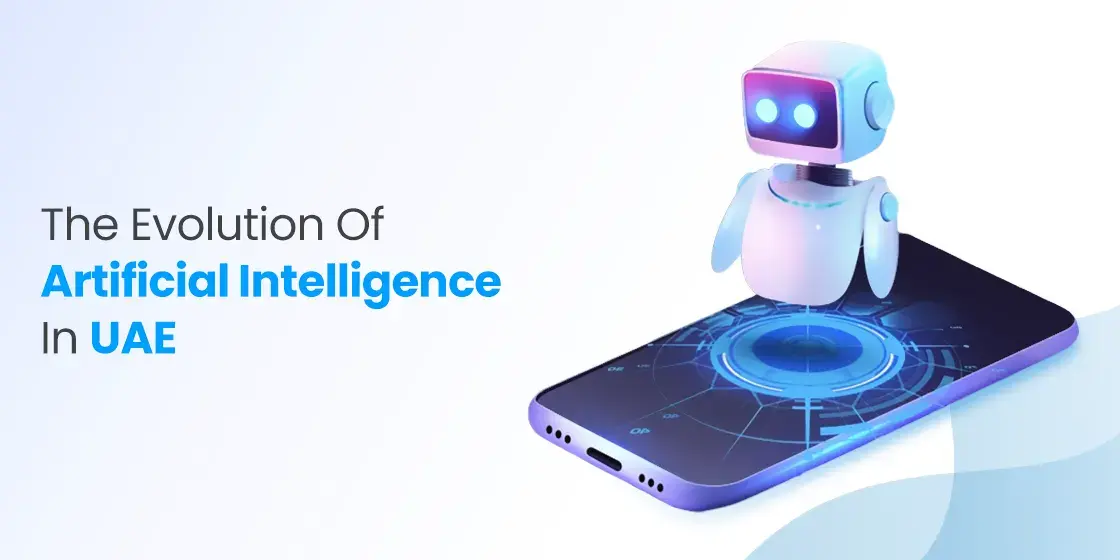Table of Content
Know the Key Differentiating Points Between MLOps and DevOps Below
Building a software powered by machine learning technology isn’t an easy job. While picking tools looks like a straightforward job, beginners often stay confused when it comes to select the right development practice. Currently, there are two popular practices employed in building ML software systems – MLOps and DevOps. Having an understanding of both practices is important for developers. It helps them to choose correctly between both models, precisely by considering their core objectives.
While DevOps is not a new concept for the development teams, the implementation and usage of MLOps is certainly a fresh one. For starters, it is basically the name of integrating DevOps with machine learning methodologies. It defines how dev and data science teams can work with each other by building a chain of collaboration. This is relatively a new concept, so learning it in the right manner is important for those who want to build ML systems and offer AI software development services to the clients.
If you are also one of them who want to understand the differences between MLOps and DevOps operations, read this article in detail. It will let you understand how both practices work, so that you can make the right selection decision according to core project objectives.
What is DevOps?

DevOps is a software development and IT operations methodology that emphasizes collaboration, automation, and continuous integration and delivery (CI/CD). It bridges the gap between software development and IT operations by fostering a culture of shared responsibility. The goal of DevOps is to shorten the software development lifecycle while maintaining high software quality and reliability. By integrating development and operations teams, organizations can respond to market demands faster, release software updates more frequently, and improve overall system stability.
A key aspect of DevOps is automation, which plays a crucial role in streamlining software development, testing, deployment, and infrastructure management. DevOps leverages tools such as Docker, Kubernetes, Jenkins, Terraform, and Ansible to automate processes like configuration management, code deployment, and monitoring. Continuous integration ensures that developers frequently merge their code changes into a shared repository, while continuous delivery automates the release process, ensuring that new features and updates reach users quickly and reliably.
DevOps also fosters a culture of continuous improvement through monitoring, feedback loops, and iterative development. Teams use monitoring and observability tools such as Prometheus, Grafana, and ELK Stack to gain real-time insights into application performance and system health. By analyzing this data, teams can proactively identify and resolve issues before they impact end users. DevOps also encourages collaboration across departments, breaking down traditional silos and promoting a culture of shared ownership.
Benefits of DevOps
DevOps can help teams to become more proactive and flexible in managing dev operations. It offers countless benefits to the teams in terms of enhancing framework and communication. Let’s take a look at some of them below.
Improved Agility
In the field of DevOps, one of the most essential practices is the automation of the software development and delivery lifecycle. This involves leveraging technology to perform repetitive and time-consuming tasks that would otherwise require manual intervention. Key processes such as code testing, software deployment, and infrastructure provisioning are automated using various app development tools and frameworks. By implementing automation, teams can significantly reduce human error, enhance consistency, and accelerate the overall development cycle.
Top-notch Security
DevOps solutions frequently incorporate security measures to enhance both efficiency and overall outcomes. This methodology ensures that security is not treated as a separate or final step in the development cycle but is instead seamlessly integrated into every stage of the software development and delivery process. This approach enhances the resilience of applications while maintaining the speed and agility that DevOps aims to achieve.
Faster Deployment
DevOps plays a crucial role in accelerating the process of delivering new code changes, whether they involve bug fixes, performance improvements, or the introduction of new features. By fostering a culture of continuous integration and continuous delivery (CI/CD), DevOps enables development teams to push updates into production quickly and efficiently. This rapid yet controlled approach helps organizations maintain a competitive edge by delivering high-quality software at an accelerated pace.
What is MLOps?

MLOps (Machine Learning Operations) is a set of practices and tools designed to streamline and automate the lifecycle of machine learning models. Similar to DevOps, which focuses on software development and IT operations, MLOps integrates machine learning with software engineering principles to ensure models are reproducible, scalable, and reliable in production environments. It encompasses processes such as data preprocessing, model training, validation, deployment, monitoring, and continuous improvement.
One of the key challenges in machine learning is ensuring that models perform consistently when deployed in real-world scenarios. MLOps addresses this by incorporating automation, version control, and continuous integration and deployment (CI/CD) pipelines. Automated model retraining, data drift detection, and performance monitoring help maintain model accuracy and effectiveness over time. Additionally, MLOps promotes the use of standardized environments, to ensure that models can be easily deployed and scaled across different infrastructure setups.
Beyond automation and deployment, MLOps also emphasizes governance, security, and compliance in machine learning applications. As machine learning models often rely on sensitive data, organizations must implement robust data governance policies to ensure privacy. MLOps frameworks include monitoring tools that track model performance, helping teams mitigate risks and maintain transparency. By integrating MLOps, businesses can not only accelerate the blockchain app development of machine learning models but also enhance their trustworthiness, and long-term sustainability.
Benefits of MLOps
MLOps offers several benefits to teams if being used correctly. It helps to build collaboration between dev and data science, so that better AI models can be developed and deployed in a shorter frame of time. Here are some notable benefits of MLOps defined below.
Reproducible Workflows
MLOps plays a crucial role in creating reproducible workflows by standardizing and automating key processes in the machine learning lifecycle. One of the primary challenges in machine learning development is ensuring that models produce consistent results across different environments, datasets, and iterations. MLOps addresses this by implementing version control for code, data, and models, allowing teams to track changes and roll back to previous states when needed.
Quick Deployment of Models
MLOps significantly enhances the deployment of high-precision machine learning models by automating and standardizing the deployment pipeline. Traditional machine learning models often face challenges when transitioning from research and development to production due to inconsistencies in data, infrastructure, and deployment environments. MLOps streamlines this process by integrating Continuous Integration and Continuous Deployment (CI/CD) practices tailored for machine learning workflows.
Management of ML Lifecycle
MLOps provides a structured and efficient approach to managing the entire machine learning lifecycle. One of its key benefits is automation, which reduces manual effort and streamlines repetitive tasks such as data preprocessing, model training, validation, and version control. By implementing CI/CD pipelines specifically tailored for machine learning, MLOps ensures that models are consistently built, tested, and deployed in a reproducible manner.
MLOps vs DevOps: Which One to Choose?

When deciding between MLOps and DevOps, developers should consider the nature of their projects and the specific challenges they aim to address. DevOps is best suited for traditional software development, where the focus is on automating the software development lifecycle (SDLC), ensuring seamless integration, deployment, and continuous monitoring of applications. It emphasizes CI/CD pipelines, infrastructure as code (IaC), and automation to deliver reliable and scalable software solutions.
On the other hand, MLOps is specifically designed for machine learning projects. Unlike traditional software development models, machine learning practices require constant retraining due to data drift and evolving real-world conditions. MLOps integrates machine learning workflows with DevOps principles, providing automated pipelines for data preprocessing. While DevOps focuses on software deployment efficiency, MLOps extends these capabilities by addressing the unique challenges of model lifecycle management, making it the preferred choice for AI and data science teams.
Frequently Asked Questions
| What is DevOps? DevOps is a set of practices that combine software development and IT operations to enhance collaboration, and continuous delivery. It aims to improve efficiency, speed, and quality in software development and deployment. |
| What is MLOps? MLOps is a set of practices that combine machine learning (ML) and DevOps to streamline the development, and deployment of ML models. It focuses on automating workflows, collaboration, and maintaining model performance throughout its lifecycle. |
| What is the difference between MLOps and DevOps? The main difference between MLOps and DevOps is that MLOps focuses on the lifecycle of machine learning models, while DevOps focuses on software development and IT operations. |
Final Words
That concludes our entire blog in which we have discussed core differences between MLOps and DevOps. AI engineers working on advanced systems need to know the working methodology of both models. They need to know how MLOps and DevOps function, as that becomes very handy in handling complex AI projects. This blog has described key differences between both practices, so that you can make the selection choice properly knowing all the implications.

Empower your digital journey with StruqtIO - Your dedicated partner for cutting-edge custom software development, innovation, and digital transformative solutions. Harness the power of technology to elevate your business and redefine your digital landscape today.


